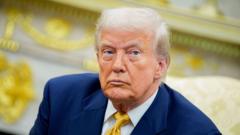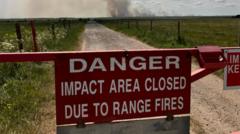Are Trump's Global Tariffs Illegal? US Court Says Yes!

Published: 2025-08-29 22:28:03 | Category: wales
In a significant legal development, a US appeals court has deemed most global tariffs imposed by former President Donald Trump as illegal, challenging a key aspect of his economic policy during his presidency. This ruling could potentially reshape the landscape of international trade and foreign policy, particularly concerning tariffs that have been a contentious tool in diplomatic relations.
Last updated: 28 October 2023 (BST)
Key Takeaways
- A US Court of Appeals ruled Trump’s tariffs illegal, impacting international trade.
- The ruling challenges the use of the International Emergency Economic Powers Act by the president.
- The case may be appealed to the US Supreme Court before the ruling takes effect.
- Tariffs imposed on China, Mexico, and Canada are among those affected.
- The court emphasised that tariff imposition is a Congressional power, not a presidential one.
The Court's Decision Explained
The US Court of Appeals for the Federal Circuit delivered a 7-4 ruling that declared many of the tariffs instituted by Trump as "invalid as contrary to law." The court's decision emerged from a case that focused on the legality of Trump's tariffs, which he argued were justified under the International Emergency Economic Powers Act (IEEPA). This Act permits the president to impose sanctions and trade restrictions in response to "unusual and extraordinary threats" to the United States.
The court’s ruling specifically challenged Trump's rationale for invoking the IEEPA, asserting that the imposition of tariffs is fundamentally a legislative power reserved for Congress. This critical interpretation suggests a limitation on presidential powers regarding trade and tariffs, potentially altering the dynamics of how future administrations can approach international economic relations.
Understanding the International Emergency Economic Powers Act
The IEEPA was originally enacted during the 1970s to allow the president to respond to national emergencies that threaten US national security. However, its application in this context raises questions about the extent of executive authority in economic matters. Trump's administration declared a national emergency regarding trade imbalances, claiming that they posed a risk to US security. The court, however, found that such claims do not legitimise tariff imposition under the Act.
Immediate and Long-Term Implications
The immediate effects of the court’s ruling remain uncertain. With the decision not set to take effect until October 2023, the Trump administration has the opportunity to appeal to the US Supreme Court. Should the Supreme Court choose to hear the case, it could result in further legal scrutiny of executive powers concerning trade.
In the long term, if the ruling stands, it could significantly limit the ability of future presidents to utilise tariffs as a tool for foreign policy. This may lead to a reliance on legislative processes for imposing tariffs, which often involve lengthy negotiations and bipartisan agreement, potentially slowing down the government’s response to international economic issues.
The Broader Context of Tariffs
Trump's tariffs have been part of a broader strategy to reshape trade relations, particularly with countries like China, Mexico, and Canada. The tariffs, often described as "reciprocal," were intended to counteract perceived unfair trade practices and to protect American industries. However, critics argue that they have led to higher consumer prices and strained international relations.
Since the tariffs were implemented, numerous sectors, including agriculture and manufacturing, have voiced concerns about the economic impact. The legal ruling may provide a pathway for businesses affected by these tariffs to seek restitution or challenge their validity in other forums.
What Happens Next?
As the legal landscape unfolds, the future of Trump's tariffs hangs in the balance. Should the Supreme Court opt to review the case, it will have the opportunity to clarify the boundaries of presidential authority in economic matters. This could set a significant precedent for future administrations, shaping the way the United States engages in international trade.
Moreover, the ruling underscores the ongoing debate surrounding the balance of power between the presidency and Congress, particularly in areas that directly affect the economy and foreign policy. As legal experts and policymakers analyse the implications of this decision, it will be crucial to observe how it influences upcoming trade negotiations and legislative efforts.
Conclusion
The recent ruling by the US Court of Appeals presents a critical juncture in the application of tariffs and the extent of executive power in economic policy. As discussions continue regarding the legality and implications of these tariffs, the future of US trade relations remains uncertain. The outcome of potential appeals could redefine how trade policy is shaped in the coming years.
What are your thoughts on the balance of power in economic policy? Will this ruling change how future administrations approach tariffs? #Tariffs #TradePolicy #USLaw
FAQs
What are tariffs?
Tariffs are taxes imposed by a government on imported goods, intended to raise revenue or protect domestic industries from foreign competition.
Why did Trump impose tariffs?
Trump imposed tariffs to address trade imbalances, claiming they were necessary for national security and to protect US jobs and industries.
What is the International Emergency Economic Powers Act?
The IEEPA allows the president to respond to national emergencies by imposing sanctions or trade restrictions to protect US national security interests.
What are the potential consequences of the court ruling?
The ruling could limit presidential powers regarding tariffs, requiring Congress to take a more active role in trade negotiations and decisions.
Can the court's decision be appealed?
Yes, the ruling can be appealed to the US Supreme Court, which will have the final say on the legality of the tariffs.



